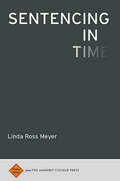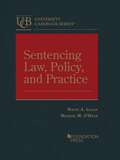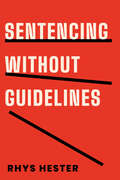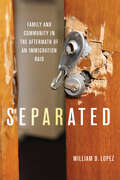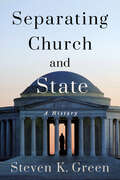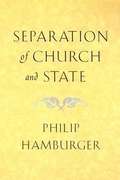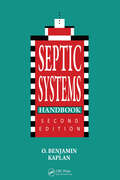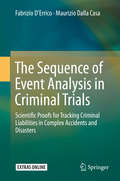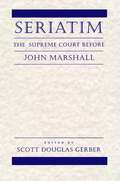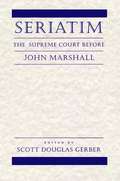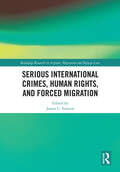- Table View
- List View
Sentencing in the Age of Information: From Faust to Macintosh
by Katja Franko AasHow does the fact that we live in information societies reflect on the nature of penal discourse and practice? Applying media and communication studies to sentencing and penal culture, Kate Franko Aas offers a lucid and innovative account of how punishment is adjusting to a new cultural climate marked by growing demands for information processing, transparency and accountability. This significant book explores a number of recent penal developments, such as risk assessment instruments, sentencing guidelines and computerized sentencing information systems, and argues that they are instruments of justice with so-called Macintosh traits, offering pre-programmed answers and solutions. Franko Aas touches upon issues of decision-making at-a-distance, the exercise of discretion, databases, disembodiment and the changing nature of subjectivity. She explores information technology as a cultural environment with profound implications for the nature of penal knowledge, governance and identity constitution. Sentencing in the Age of Information is essential reading for scholars and students interested in sentencing, penal culture, criminology, sociology of law and media and communication studies. Joint winner of the 2006 Hart/Socio-Legal Studies Association Book Prize.
Sentencing in Time
by Linda Ross MeyerExactly how is it we think the ends of justice are accomplished by sentencing someone to a term in prison? How do we relate a quantitative measure of time—months and years—to the objectives of deterring crime, punishing wrongdoers, and accomplishing justice for those touched by a criminal act? Linda Ross Meyer investigates these questions, examining the disconnect between our two basic modes of thinking about time—chronologically (seconds, minutes, hours), or phenomenologically (observing, taking note of, or being aware of the passing of time). In Sentencing in Time, Meyer asks whether—in overlooking the irreconcilability of these two modes of thinking about time—we are failing to accomplish the ends we believe the criminal justice system is designed to serve. Drawing on work in philosophy, legal theory, jurisprudence, and the history of penology, Meyer explores how, rather than condemning prisoners to an experience of time bereft of meaning, we might instead make the experience of incarceration constructively meaningful—and thus better aligned with social objectives of deterring crime, reforming offenders, and restoring justice.
Sentencing Law, Policy, and Practice (UNIVERSITY CASEBOOK SERIES®)
by Wayne Logan Michael O'HearWith guilt in the vast majority of criminal cases now resolved by guilty pleas, sentencing is a matter of surpassing importance in the American criminal process. Reflecting its significance, the sentencing phase has been buffeted by successive waves of reform efforts, complicating an already challenging topic for law students and instructors alike. Sentencing Law, Policy, and Practice covers this terrain in a manner that is comprehensive, nuanced, and accessible. Coverage includes core sentencing topics, such as the purposes of punishment, constitutional limitations on punishment, sentencing guidelines, and the disparate treatment of defendants, as well as in-depth coverage of other critically important subjects that often receive only glancing treatment in sentencing casebooks―community supervision, economic sanctions, capital punishment, and collateral consequences. The book takes a multi-disciplinary approach, frequently drawing upon cutting-edge legal and social science research, providing opportunities for students to analyze and discuss topics in new and often provocative ways. The text has sufficient breadth and depth for use in a three-credit course but is also readily adaptable for use in a two-credit format.
Sentencing Serious Sex Offenders: How Judges Decide when Discretion Is Wide
by Diarmuid GriffinAddressing a lack of high-quality sentencing information in Ireland, this important book explores the factors that influence judges to impose a sentence of long-term imprisonment in sexual offence cases. Judges have made it clear that sentences of 15 years to life imprisonment are to be reserved for offending that is ‘truly egregious’. Griffin, using over 100 serious sexual offence cases, examines what this means in practice. The book is designed to be used in the classroom and the court, as well as providing a solid evidence base to inform the public and policy discourse on sentencing.
Sentencing without Guidelines
by Rhys HesterSentencing matters. Reform initiatives hope to impart more uniformity and fairness in sentencing. Tough-on-crime laws like “three strikes” and mandatory minimum provisions deprive judges of sentencing discretion. While sentencing guidelines have been adopted by approximately 20 states since the early 1980s, many judges operate without guidelines. Sentencing without Guidelines is Rhys Hester’s deep dive into how South Carolina, which never passed sentencing guideline legislation, nonetheless created meaningful punishment reform. It achieved uniformity in sentencing with a traveling circuit of judges, informal norms among judges, and the unique phenomenon of the “Plea Judge” to manage cases. Hester examines how prior convictions, race, and geographical differences impact sentences to explain why individuals get the criminal sentences they do. He also explores how legal reform mechanisms can influence punishment goals and policy. Sentencing without Guidelines shows the benefits and drawbacks South Carolina experienced as it met sentencing reform goals. These lessons can be translated into policy for other jurisdictions.
Sentencing Youth to Life in Prison: Justice Denied
by James Windell Kathi Milliken-BoydThis book analyzes the impact of the U.S. Supreme Court rulings deeming juvenile life without parole (LWOP) sentences to be cruel and unusual punishment. These Court decisions brought about controversy and resistance in the criminal justice field, while at the same time providing hope for those 2,300 people who never thought they had a chance to experience life as an adult outside prison. By looking in depth at the lives of some of the individuals serving life terms, and understanding both the prosecutors who oppose review and resentencing of juvenile lifers and those who are sincerely following the Supreme Court’s guidelines, this book provides a comprehensive understanding of the issues – as well as the people – involved in the sentencing (and potential resentencing) of juveniles to life without the possibility of parole. The authors provide unique, perceptive and straightforward profiles on some of the prisoners who were ultimately sentenced to LWOP after being involved in criminal offenses committed before their 18th birthdays. The book poignantly features the experiences of young people who did not commit a murder yet were still sentenced to life terms, but also delves into the perspectives of the families of victims of juvenile offenders, prosecutors on both sides of the issue, psychologists who have interviewed many of the juvenile lifers and advocates for change in the way juveniles are treated by the criminal justice system. The decisions in Miller v. Alabama and Montgomery v. Louisiana clearly demonstrated that the Court’s view of juveniles evolved over decades to reflect advances in our understanding of the unique characteristics of youth and their involvement in juvenile crimes. This book takes the position that the sentence of life without the possibility of parole for youth is wasteful of both human lives and scarce public resources. The authors write about the human concerns on both sides of the question, and, ultimately, allow readers to make their own decisions about how society should best handle juvenile offenders. This engaging ethnographic treatment will appeal to students and scholars of criminology, corrections, juvenile justice, and delinquency; practitioners working in social policy; and all those interested in a criminal justice system capable of positive outcomes for involved youth.
El sentido de la realidad: Sobre las ideas y su historia
by Isaiah BerlinTaurus recupera El sentido de la realidad, el libro más personal de uno de los principales pensadores liberales del siglo XX. ¿Cómo construir una sociedad decente?¿Por qué ciertas ideas aparentemente nobles y hermosaspueden alimentar las peores ideologías? Referente ineludible en la historia de las ideas, Berlin recorre magistralmente, en estos nueve ensayos, las ideas que han gobernado la historia europea durante los últimos tres siglos: nacionalismo, liberalismo y especialmente marxismo. Con el fin de extraer lecciones morales, Berlin se pregunta por qué los seres humanos tienden a admirar a hombres movidos por la ambición, los celos o la vanidad monomaníaca -incluidas figuras notables de la historia como Pedro el Grande y Napoleón-, y proporciona algunas respuestas, siempre reveladoras, en este estudio de las ideas. El sentido de la realidad incluye textos clave de quien ha sido considerado uno de los mejores ensayistas en inglés, y cubre un amplio abanico de temas: el realismo en la historia, naturaleza y el impacto del marxismo, la historia del socialismo, la radical revolución cultural llevada a cabo por los románticos, las nociones rusas de compromiso artístico, o la práctica y el origen del nacionalismo... Reseñas:«Este libro es indispensable para cualquiera que quiera comprender la historia de las ideas.»John Gray, The New York Times Book Review «El viejo zorro del liberalismo ofrece esta obra perspicaz. Es tan brillante a la hora de repensar el pasado como a la de transmitir su pensamiento.»Kirkus Reviews «Erudito pero no académico, se dirige al lector general, y habla con una energía tan contagiosa que nos arrastra a un territorio que nos parecía inaccesible, y se convierte en el mejor guía para movernos en la emocionante historia de las ideas.»Robert Darnton, The New York Review of Books «Si es posible elevar más una reputación ya tan notable, estos ensayos podrían lograrlo. Son textos de urbanidad, perspicacia, profunda erudición y gran elegancia literaria.»A.C. Grayling, Financial Times
The Sentimental Court: The Affective Life of International Criminal Justice (Cambridge Studies in Law and Society)
by Jonas BensModern law seems to be designed to keep emotions at bay. The Sentimental Court argues the exact opposite: that the law is not designed to cast out affective dynamics, but to create them. Drawing on extensive ethnographic fieldwork - both during the trial of former Lord's Resistance Army commander Dominic Ongwen at the International Criminal Court's headquarters in The Netherlands and in rural northern Uganda at the scenes of violence - this book is an in-depth investigation of the affective life of legalized transitional justice interventions in Africa. Jonas Bens argues that the law purposefully creates, mobilizes, shapes, and transforms atmospheres and sentiments, and further discusses how we should think about the future of law and justice in our colonial present by focusing on the politics of atmosphere and sentiment in which they are entangled.
Separate: The Story of Plessy v. Ferguson, and America's Journey from Slavery to Segregation
by Steve LuxenbergA myth-shattering narrative of how a nation embraced "separation" and its pernicious consequences. <P><P> Plessy v. Ferguson, the Supreme Court case synonymous with “separate but equal,” created remarkably little stir when the justices announced their near-unanimous decision on May 18, 1896. Yet it is one of the most compelling and dramatic stories of the nineteenth century, whose outcome embraced and protected segregation, and whose reverberations are still felt into the twenty-first. <P><P> Separate spans a striking range of characters and landscapes, bound together by the defining issue of their time and ours—race and equality. Wending its way through a half-century of American history, the narrative begins at the dawn of the railroad age, in the North, home to the nation’s first separate railroad car, then moves briskly through slavery and the Civil War to Reconstruction and its aftermath, as separation took root in nearly every aspect of American life. <P><P>Award-winning author Steve Luxenberg draws from letters, diaries, and archival collections to tell the story of Plessy v. Ferguson through the eyes of the people caught up in the case. Separate depicts indelible figures such as the resisters from the mixed-race community of French New Orleans, led by Louis Martinet, a lawyer and crusading newspaper editor; Homer Plessy’s lawyer, Albion Tourgée, a best-selling author and the country’s best-known white advocate for civil rights; Justice Henry Billings Brown, from antislavery New England, whose majority ruling endorsed separation; and Justice John Harlan, the Southerner from a slaveholding family whose singular dissent cemented his reputation as a steadfast voice for justice. <P><P>Sweeping, swiftly paced, and richly detailed, Separate provides a fresh and urgently-needed exploration of our nation’s most devastating divide.
Separated: Family and Community in the Aftermath of an Immigration Raid
by William D. LopezWilliam D. Lopez details the incredible strain that immigration raids place on Latino communities—and the families and friends who must recover from their aftermath.2020 International Latino Book Awards Winner First Place, Mariposa Award for Best First Book - Nonfiction Honorable Mention, Best Political / Current Affairs BookOn a Thursday in November 2013, Guadalupe Morales waited anxiously with her sister-in-law and their four small children. Every Latino man who drove away from their shared apartment above a small auto repair shop that day had failed to return—arrested, one by one, by ICE agents and local police. As the two women discussed what to do next, a SWAT team clad in body armor and carrying assault rifles stormed the room. As Guadalupe remembers it, "The soldiers came in the house. They knocked down doors. They threw gas. They had guns. We were two women with small children... The kids terrified, the kids screaming."In Separated, William D. Lopez examines the lasting damage done by this daylong act of collaborative immigration enforcement in Washtenaw County, Michigan. Exploring the chaos of enforcement through the lens of community health, Lopez discusses deportation's rippling negative effects on families, communities, and individuals. Focusing on those left behind, Lopez reveals their efforts to cope with trauma, avoid homelessness, handle worsening health, and keep their families together as they attempt to deal with a deportation machine that is militarized, traumatic, implicitly racist, and profoundly violent. Lopez uses this single home raid to show what immigration law enforcement looks like from the perspective of the people who actually experience it. Drawing on in-depth interviews with twenty-four individuals whose lives were changed that day in 2013, as well as field notes, records obtained under the Freedom of Information Act, and his own experience as an activist, Lopez combines rigorous research with moving storytelling. Putting faces and names to the numbers behind deportation statistics, Separated urges readers to move beyond sound bites and consider the human experience of mixed-status communities in the small towns that dot the interior of the United States.
Separating Church and State: A History (Religion and American Public Life)
by Steven K. GreenSteven K. Green, renowned for his scholarship on the separation of church and state, charts the career of the concept and helps us understand how it has fallen into disfavor with many Americans. In 1802, President Thomas Jefferson distilled a leading idea in the early American republic and wrote of a wall of separation between church and state. That metaphor has come down from Jefferson to twenty-first-century Americans through a long history of jurisprudence, political contestation, and cultural influence. This book traces the development of the concept of separation of church and state and the Supreme Court's application of it in the law. Green finds that conservative criticisms of a separation of church and state overlook the strong historical and jurisprudential pedigree of the idea. Yet, arguing with liberal advocates of the doctrine, he notes that the idea remains fundamentally vague and thus open to loose interpretation in the courts. As such, the history of a wall of separation is more a variable index of American attitudes toward the forces of religion and state. Indeed, Green argues that the Supreme Court's use of the wall metaphor has never been essential to its rulings. The contemporary battle over the idea of a wall of separation has thus been a distraction from the real jurisprudential issues animating the contemporary courts.
Separating Powers: International Law before National Courts
by David HaljanThe more international law, taken as a global answer to global problems, intrudes into domestic legal systems, the more it takes on the role and function of domestic law. This raises a separation of powers question regarding law-making powers. This book considers that specific issue. In contrast to other studies on domestic courts applying international law, its constitutional orientation focuses on the presumptions concerning the distribution of state power. It collects and examines relevant decisions regarding treaties and customary international law from four leading legal systems, the US, the UK, France, and the Netherlands. Those decisions reveal that institutional and conceptual allegiances to constitutional structures render it difficult for courts to see their mandates and powers in terms other than exclusively national. Constitutionalism generates an inevitable dualism between international law and national law, one which cannot necessarily be overcome by express constitutional provisions accommodating international law. Valuable for academics and practitioners in the fields of international and constitutional law.
Separation Of Church And State (Revised Edition)
by Philip HamburgerIn a powerful challenge to conventional wisdom, Philip Hamburger argues that the separation of church and state has no historical foundation in the First Amendment. The detailed evidence assembled here shows that eighteenth-century Americans almost never invoked this principle. Although Thomas Jefferson and others retrospectively claimed that the First Amendment separated church and state, separation became part of American constitutional law only much later. In a powerful challenge to conventional wisdom, Philip Hamburger argues that the separation of church and state has no historical foundation in the First Amendment. The detailed evidence assembled here shows that eighteenth-century Americans almost never invoked this principle. Although Thomas Jefferson and others retrospectively claimed that the First Amendment separated church and state, separation became part of American constitutional law only much later. <p><p> Hamburger shows that separation became a constitutional freedom largely through fear and prejudice. Jefferson supported separation out of hostility to the Federalist clergy of New England. Nativist Protestants (ranging from nineteenth-century Know Nothings to twentieth-century members of the K.K.K.) adopted the principle of separation to restrict the role of Catholics in public life. Gradually, these Protestants were joined by theologically liberal, anti-Christian secularists, who hoped that separation would limit Christianity and all other distinct religions. Eventually, a wide range of men and women called for separation. Almost all of these Americans feared ecclesiastical authority, particularly that of the Catholic Church, and, in response to their fears, they increasingly perceived religious liberty to require a separation of church from state. American religious liberty was thus redefined and even transformed. In the process, the First Amendment was often used as an instrument of intolerance and discrimination.
Separation of Powers and Legislative Organization
by Gisela SinThis book examines how the constitutional requirements of the lawmaking process, combined with the factional divisions within parties, affect U. S. representatives' decisions about how to distribute power among themselves. The incorporation of the presidential, senatorial, and House factions in the analysis of House rule making marks an important departure from previous theories, which analyze the House as an institution that makes laws in isolation. This book argues that, by constitutional design, the success of the House in passing legislation is highly contingent on the actions of the Senate and the president; and therefore, also by constitutional design, House members must anticipate such actions when they design their rules. An examination of major rule changes from 1879 to 2013 finds that changes in the preferences of constitutional actors outside the House, as well as the political alignment of these political actors vis-. . . -vis House factions, are crucial for predicting the timing and directionality of rule changes.
The Separation of Powers in the Contemporary Constitution
by Roger MastermanRoger Masterman examines the dividing lines between the powers of the judicial branch of government and those of the executive and legislative branches in the light of two of the most significant constitutional reforms of recent years: the Human Rights Act (1998) and Constitutional Reform Act (2005). Both statutes have implications for the separation of powers within the United Kingdom constitution. The Human Rights Act brings the judges into much closer proximity with the decisions of political actors than previously permitted by the Wednesbury standard of review and the doctrine of parliamentary sovereignty, while the Constitutional Reform Act marks the emergence of an institutionally independent judicial branch. Taken together, the two legislative schemes form the backbone of a more comprehensive system of constitutional checks and balances policed by a judicial branch underpinned by the legitimacy of institutional independence.
SEPs, SSOs and FRAND: Asian and Global Perspectives on Fostering Innovation in Interconnectivity (Routledge Research in Intellectual Property)
by Kung-Chung Liu Reto M. HiltyThis book is a very useful reference guide on how de jure and de facto standards are being developed and how these standards compete against each other. The book also looks at how FRAND commitments are being determined across countries, how these disputes have played out, especially in Asia, and how they can be better dealt with in future globally. The book gives a broad overview of the business model of dominant SEP patentees and analyzes some standards for FRAND licensing of SEPs which are converging in major Asian jurisdictions. It highlights the need for ex ante regulation in the FRAND licensing of SEPs and suggests how we can reconcile conflicts which may arise from different legal standards. This book provides detailed and comprehensive analysis of recent SEP cases with an emphasis on Asia and will interest anyone who wishes to have more insight into the legal, policy, industrial and economic implications of such issues.
Septic Systems Handbook
by O. Benjamin KaplanSeptic Systems Handbook, Second Edition covers all aspects of such topics as septic tanks, perk tests, leachlines, and onsite disposal technologies. This handy reference is filled with numerous practical tips for troubleshooting and creative problem solving. The many appendices offer valuable information, including dealing effectively with bureaucr
The Sequence of Event Analysis in Criminal Trials
by Fabrizio D'Errico Maurizio Dalla CasaThis book presents a general method that lawyers, prosecutors and judges can follows to assess the quality and scientific content of technical work done for an accident and crime scene reconstruction. Using multilevel sequence of events analysis allows all key events to be fully identified, which in turn assists judicial bodies in identifying where to assign specific criminal liability. Created from a concept long sought by the two authors (an engineer and an attorney), the method allows readers without any technical background to progress from an examination of evidence gathered at the scene of a complex accident and to reconstruct "beyond reasonable doubt" the events that took place. Once created and scientifically verified by the sequence of events analysis, the chain of key events serves as a reference source for various levels of complex organizations and inter-organization structures in cases involving complex criminal responsibilities.
Serbian Paramilitaries and the Breakup of Yugoslavia: State Connections and Patterns of Violence (Contemporary Security Studies)
by Iva VukušićThis is the first book to offer a comprehensive analysis of the emergence, nature, and function of Serbian paramilitary units during the breakup of Yugoslavia. It addresses crucial questions pertaining to paramilitarism by using the archives of the International Criminal Tribunal for the former Yugoslavia (ICTY) in The Hague, which conducted dozens of trials relating to paramilitary violence, and records from judicial proceedings in the region. The book discusses how and why certain important paramilitary units emerged, how they functioned and transformed through the decade, what their relationships and entanglements were with the state, the Milošević regime, and organized crime. The study thus investigates interrelated ideological, political, and social factors and processes fuelling paramilitary engagement and assesses the impact of this engagement on victims of paramilitary violence and on the state and society for which the units purportedly fought. It argues that coordinated action by a number of state institutions gave rise to paramilitaries tasked with altering borders while maintaining plausible deniability for the sponsoring regime. The outsourcing of violence by the state to paramilitaries led to a significant weakening of the very state these units and their sponsors swore to protect. The book also analyzes differences between the units and how they attacked civilians, arguing that the different forms of violence stemmed not only from the function they fulfilled for the state but also the ways in which they were set up and operated. The final chapter brings the different strands of the argument together into a coherent whole, suggesting avenues for further research, in the former Yugoslavia and beyond. This book will be of much interest to students of ethnic conflict and civil war, war crimes, Balkan politics and International Relations in general.
Serial Killers: Psychiatry, Criminology, Responsibility
by Francesca Biagi-ChaiFrancesca Biagi-Chai’s book - a translation from the French of Le Cas Landru - tackles the issue of criminal responsibility in the case of serial killers, and other 'mad' people who are nonetheless deemed to be answerable before the law. The author, a Lacanian psychoanalyst and senior psychiatrist in France, with extensive experience working in institutional settings, analyses the logic informing the crimes of famous serial killers. Addressing the Landru case (which was the inspiration for Chaplin's Monsieur Verdoux), as well as those of Pierre Rivière and Donato Bilancia, Biagi-Chai casts light on the confusion that pervades forensic psychiatry and criminal law as to the distinction between mental illness and ‘madness’. She then elaborates the consequences of her argument in a sustained critique of the insanity defence. The book includes a Foreword by the renowned psychoanalyst, Jacques-Alain Miller, and an introduction by the translators on the question of insanity before the law in the US and in the UK, which considers the pertinence of Biagi-Chai’s argument for forensic psychiatry, for criminal law, and for the increasing contemporary focus on the assessment of dangerousness and risk-management strategies in crime control practices.
Serial Violence: Analysis of Modus Operandi and Signature Characteristics of Killers (ISSN)
by Robert D. Keppel William J. BirnesLinking the murders of an alleged serial killer to successfully present a case in court involves a specific methodology that has been scrutinized by the judicial system but is largely absent in the current literature. Serial Violence: Analysis of Modus Operandi and Signature Characteristics of Killers fully explains the process of finding the nexus
Seriatim: The Supreme Court Before John Marshall
by Scott Douglas Gerber&“This absorbing collection of essay . . . goes far toward filling a void in the literature on the early justices of the world's most significant tribunal&” (Law and Politics Book Review). Seldom has American law seen a more towering figure than Chief Justice John Marshall. Yet even while acknowledging the indelible stamp Marshall put on the Supreme Court, it is possible—in fact necessary—to examine the pre-Marshall Court, and its justices, to gain a true understanding of the origins of American constitutionalism. The ten essays in this volume were specially commissioned for the book, each written by the leading authority on his or her particular subject. They examine such influential justices as John Jay, John Rutledge, William Cushing, James Wilson, John Blair, James Iredell, William Paterson, Samuel Chase, Oliver Ellsworth, and Bushrod Washington. The result is a fascinating window onto the origins of the most powerful court in the world, and on American constitutionalism itself.
Seriatim: The Supreme Court Before John Marshall
by John MarshallSeldom has American law seen a more towering figure than Chief Justice John Marshall. Indeed, Marshall is almost universally regarded as the "father of the Supreme Court" and "the jurist who started it all." Yet even while acknowledging the indelible stamp Marshall put on the Supreme Court, it is possible--in fact necessary--to examine the pre-Marshall Court, and its justices, to gain a true understanding of the origins of American constitutionalism. The ten essays in this tightly edited volume were especially commissioned for the book, each by the leading authority on his or her particular subject. They examine such influential justices as John Jay, John Rutledge, William Cushing, James Wilson, John Blair, James Iredell, William Paterson, Samuel Chase, Oliver Ellsworth, and Bushrod Washington. The result is a fascinating window onto the origins of the most powerful court in the world, and on American constitutionalism itself.
Serious International Crimes, Human Rights, and Forced Migration (Routledge Research in Asylum, Migration and Refugee Law)
by James C. SimeonThis volume elucidates and explores the interrelationships and direct causal connection between serious international crimes, serious breaches to fundamental human rights, and gross affronts to human dignity that lead to mass forced migration. Forced migration most often occurs in the context of protracted armed conflict of a noninternational nature where terrorism, fierce fighting, deep animosity, tit-for-tat retaliation, and “rapid dominance” doctrine all lead to the commission of atrocity crimes. Accordingly, this volume makes a valuable contribution to the literature and to the cause of trying to resolve mass forced displacement at its root cause, to explore the course that it takes, and how it might be prevented. The collection comprises original research by leading legal scholars and jurists focusing on the three central themes of serious international crimes, human rights, and forced migration. The work also includes a Foreword from Sir Howard Morrison, QC, former President of the Appeals Division of the International Criminal Court. The book will be a valuable resource for students, academics, researchers, and policymakers working in the areas of international law, migration, human rights, and international criminal law.
A Serious Way of Wondering
by Reynolds PriceWhen renowned novelist and poet Reynolds Price, one of Christianity's most eloquent outlaws, was invited to deliver the annual Peabody Lecture at Harvard University Memorial Church in 2001, he chose to explore a subject of fierce debate and timeless relevance: the ethics of Jesus. In two succeeding lectures at the National Cathedral and at Auburn Seminary, Price continued to explore the apparently contradictory ethics that Jesus articulates in the Gospels; and in a controversial act of artistic license, Price reimagined the historical Jesus. InA Serious Way of Wondering, Price expands these lectures to present Jesus with three problems of burning moral concern -- suicide, homosexuality, and the plight of women in male-dominated cultures and faiths. A sweeping view of the inescapable implications of Jesus' merciful life and all-embracing thought -- and of the benefits of enlarging our notions of humanity, community, and equality --A Serious Way of Wonderingis a significant contribution to Price's penetrating works of religious inquiry.

